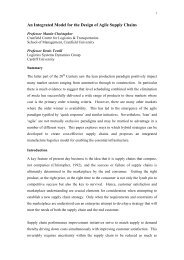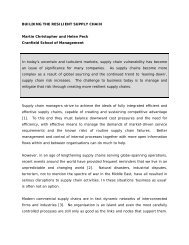Link 16 new - SCLG
Link 16 new - SCLG
Link 16 new - SCLG
Create successful ePaper yourself
Turn your PDF publications into a flip-book with our unique Google optimized e-Paper software.
68 Insurance<br />
Business Interruption Insurance can help you get back on your feet<br />
Risk Advice<br />
It is difficult to comprehend why many<br />
otherwise responsible businesses do not<br />
arrange business interruption (BI)<br />
insurance. For many, the awareness of<br />
insurance protection stops at the cover<br />
provided for physical assets such as<br />
buildings, contents and stock. But in the<br />
event of a major incident occurring, it is<br />
often the interruption to a company’s<br />
activities that will result in the greatest<br />
loss. In extreme, yet too often<br />
circumstances, this can result in a business<br />
having to cease trading.<br />
Even a relatively minor incident can have<br />
a big impact on a business if it relates to an<br />
integral part of the production process.<br />
For instance, damage to just one machine<br />
can completely halt production if that<br />
machine is a critical part of the procedure.<br />
This interruption may be long-lasting if<br />
the machine cannot easily be replaced.<br />
How does Business Interruption Cover<br />
work?<br />
BI cover will be arranged in conjunction<br />
with the property damage insurance.<br />
Effectively, it extends that cover to also<br />
include the ‘consequences’ of a major<br />
incident. These ‘consequences’ may result<br />
in a reduction in a company’s turnover.<br />
Additionally, there can be an increase in<br />
costs as the company attempts to make<br />
alternative trading arrangements and<br />
thereby minimise their turnover<br />
reduction. Both these factors will reduce<br />
the company’s gross profit over a period<br />
of time. BI insurance can compensate for<br />
this loss of gross profit.<br />
For a major incident such as a fire,<br />
explosion or catastrophic weather, the<br />
resultant damage can be so significant that<br />
a company will no longer be able to<br />
occupy their business premises. It may<br />
take time and expense to move operations<br />
to an alternative location. It can also take<br />
time to replace damaged stock, which might<br />
have to be sourced from another country.<br />
“<br />
For many, the<br />
awareness of insurance<br />
protection stops at the<br />
cover provided for<br />
physical assets such as<br />
buildings, contents<br />
and stock.<br />
”<br />
When arranging cover, the policyholder<br />
will need to select an appropriate<br />
‘indemnity period’. This represents the<br />
MAXIMUM period of time that the<br />
policyholder considers it will take to<br />
resume full trading and, importantly, to<br />
recover any loss of market share. Usually,<br />
this will be set at a period of between 12<br />
and 24 months, although longer periods<br />
can be selected.<br />
What can be included in Business<br />
Interruption Cover?<br />
Interruption as a result of a major incident<br />
directly impacting the policyholder’s<br />
business is the obvious and most common<br />
situation. However, there are a number of<br />
additional scenarios not directly related to<br />
the policyholder’s business premises that<br />
may also have a devastating impact on<br />
turnover. BI policies can usually include<br />
these either in the standard policy cover<br />
or by way of special extension. These may<br />
include loss of business due to:<br />
An incident at a major supplier’s premises.<br />
If you are heavily reliant on one particular<br />
supplier of raw material, parts etc., then<br />
your business may be impacted by a<br />
significant interruption of their operations<br />
An incident at a major customer’s<br />
premises. Likewise, you may be heavily<br />
dependent on one particular customer<br />
who may be forced to cancel orders<br />
should their business be interrupted<br />
Denial of access to your premises following<br />
an incident at the premises of a neighbour.<br />
This may involve access to your premises<br />
for yourself or your customers<br />
Damage to public utilities. If, for instance,<br />
a local electrical sub-station or waterworks<br />
is damaged, this may have a big impact on<br />
your business for a period of time<br />
As is the usual comment here, insurance<br />
should be only part of the solution. A<br />
business can take additional steps to<br />
minimise the risk and consequences of an<br />
interruption. This may include having a<br />
contingency plan to enable continued<br />
trading; good physical protections to<br />
minimise the risk of an incident occurring;<br />
alternative suppliers who may be called<br />
upon or reciprocal arrangements with a<br />
‘friendly’ business to share premises or<br />
machinery on a short-term basis.<br />
But Business Interruption cover should<br />
never be ignored. It can often make the<br />
difference between business survival and<br />
business oblivion!<br />
Keith Byrne-MBA, ACII,<br />
Senior Underwriting Advisor Tokio Marine & Nichido<br />
Fire Insurance Co. Ltd<br />
Supply Chain & Logistics Group | www.sclgme.org

















